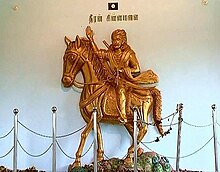Dheeran Chinnamalai
| Dheeran Chinnamalai | |||||
|---|---|---|---|---|---|
| Pattakarar of Palayakottai, Kangayam Nadu | |||||
 Statue of Dheeran Chinnamalai at Odanilai modelled after actor Sivakumar's drawing | |||||
| Predecessor | 1756-1799 Mysore Kingdom, 1799-1804 Polygar self rule | ||||
| Successor | British Rule | ||||
| Born | 17 April 1756 Melapalayam or Kasbah Palayakottai, Kangeyam, Tamil Nadu (erstwhile Mysore Kingdom) | ||||
| Died | 31 July 1805 (aged 49) Sankagiri, Salem district, Tamil Nadu or Karumalai, Oddanchatram, Dindigul district, Tamil Nadu (Madras Presidency) | ||||
| Burial | July/August 1805 Odanilai, Arachalur, Erode district, Tamil Nadu | ||||
| |||||
| Father | Rathnasamy Gounder | ||||
| Mother | Periyatha | ||||
| Religion | Shaivism | ||||
Dheeran Chinnamalai (17 April 1756 – 31 July 1805) was a Palayakkarar Pattakarar who fought against the British East India Company.
Early life[]
Dheeran Chinnamalai was born on April 17, 1756 in present-day Kangeyam, to a noble family.[1] His birth name was Theerthagiri.[2]
Polygar wars[]
Chinnamalai is said to be one of the commanders in the Polygar Wars, notably during the Second Polygar War that took place in 1801–1802.[citation needed]
After Kattabomman and Tipu Sultan's deaths in 1799, Chinnamalai sought the help of Dhondia Wagh and Maruthu Pandiyar and lead the local Pattakarars Polygars, notably Varanavasi Gounder and Vella Gounder of Erode, Chinnamalai's sister's husband Kumara Vellai of Perundurai, Appachi Gounder of Paramathi-Velur, Aravakurichi Periya Thambi, Somandurai Muchadayandi Vanaraya Gounder of Pollachi and the Naicker Polygars of Dhali, Virupakshi and Ramagiri among others, to attack the British at Coimbatore in 1800.[citation needed]
British forces managed to stop the armies of the allies and hence Chinnamalai was forced to attack Coimbatore along with the above Polygars of Kongu Nadu. His army was defeated and he escaped from the British forces.[3] Chinnamalai engaged in guerrilla warfare and defeated the British in battles at Cauvery in 1801, Odanilai kangeyam in 1802 and Arachalur in 1804.[2]
Death[]
Chinnamalai was betrayed by his cook Nallapan and was captured by the British in 1805. Nallappan usurped the title of Nallasenapthi Sarkarai Manradiar with British support.[citation needed] Some sources say he was hanged at Sankagiri Fort on 2 August 1805, as also were his two brothers; other sources give the date as 31 July.[3][4]
Legacy[]

Statues and memorials commemorating Chinnamalai exist in Chennai, Tiruchirappalli, Erode and Odanilai.[2][5]
On 31 July 2005, a commemorative postage stamp commemorating him was released by India Post.[6]
Until 1997, Tiruchirapalli division of Tamil Nadu State Transport Corporation was known as Dheeran Chinnamalai Transport Corporation.[7][page needed]
The headquarter of Erode Municipal Corporation was named after him.[4]
References[]
- ^ "Celebrating Dheeran Chinnamalai: Saluting his ideals or inciting casteist passions?". The News Minute. 18 April 2016. Retrieved 27 June 2021.
- ^ Jump up to: a b c "Dheeran Chinnamalai statue to be installed in Odanilai soon". The Hindu. 10 July 2007. Archived from the original on 1 December 2007.
- ^ Jump up to: a b "Chinnamalai, a lesser-known freedom fighter of Kongu soil". The Hindu. 2 August 2008.
- ^ Jump up to: a b "In memory of a valiant Kongu Chieftain". The Times of India. 5 April 2012.
- ^ "Memorial of Dheeran Chinnamalai set for face lift". The Times of India. 18 April 2013.
- ^ "Postage Stamps". postagestamps.gov.in. Retrieved 12 September 2015.
- ^ P. Jegadish Gandhi (1998). State Transport undertakings. Deep and Deep. ISBN 9788176290845.
| Wikimedia Commons has media related to Dheeran Chinnamalai. |
- 1756 births
- 1805 deaths
- Indian revolutionaries
- Tamil monarchs
- People from Erode district
- People executed by British India by hanging